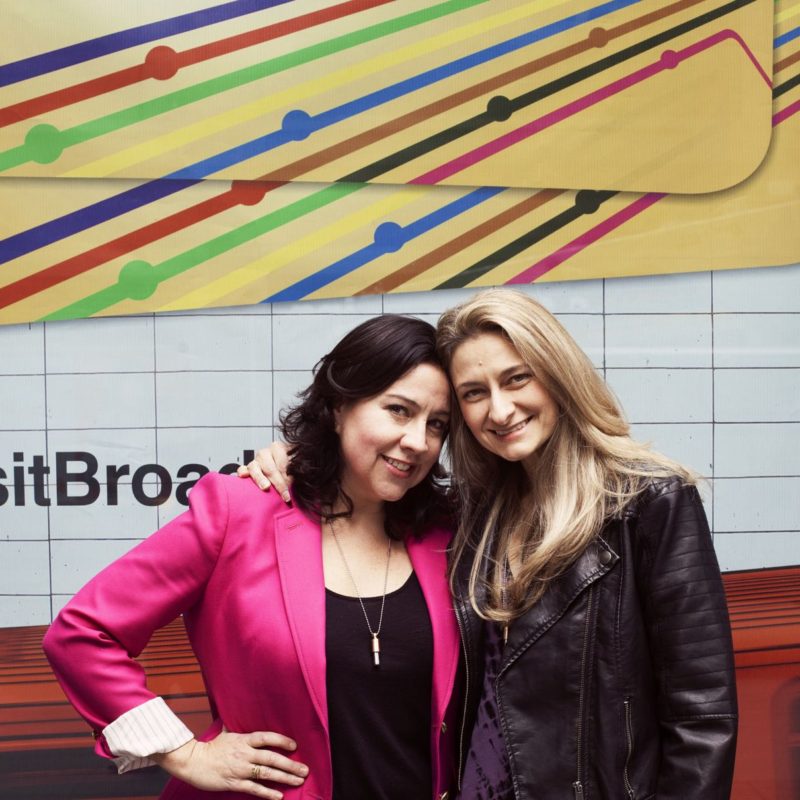An Interview with Kristen Anderson-Lopez and Sara Wordsworth
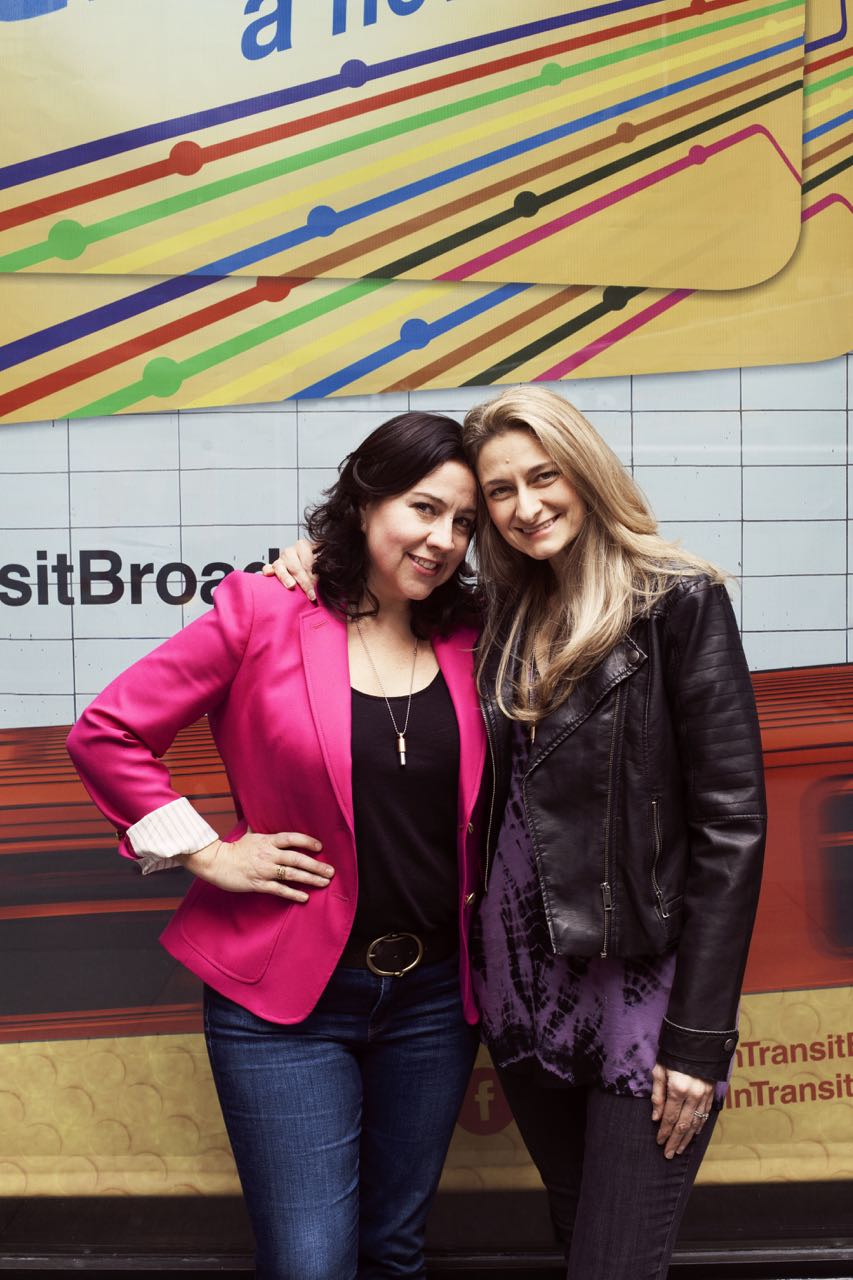
Written by Victoria Myers
Photography by Sofia Colvin
December 12th, 2016
In 2010 the musical In Transit ran Off-Broadway for a little over a month, and now, six years later, it is playing at the Circle in the Square Theatre and marking the Broadway debuts of the show’s writers. Two of those writers are Kristen Anderson-Lopez, who has an Oscar for “Let it Go” from Frozen, and Sara Wordsworth. While the show is in previews, Kristen, Sara, and co-writers James-Allen Ford and Russ Kaplan, have been busy making tweaks to the a capella musical. In Transit tells the stories of people trying to literally and figuratively navigate New York City, skills that are also needed to mount a Broadway musical within the fairly insular world of New York City theatre. Shortly before opening night, we talked to Kristen and Sara about their writing process, developing an out-of-the-box, contemporary show, and why so few musicals by women get to Broadway.
One of the things that’s always interesting to me to talk about with lyricists is how you decide which moments are dialogue and what moments are lyrics.
Kristen: That’s an interesting thing. It’s a very intuitive choice for me. It’s often that the song is connected to what’s driving forward the emotional beat. Then, if there are little plot-based details, or little real life plot-based details, sometimes I will turn those into lines so that the thrust of the song is always in that main topic and that the little diversions are dialogue.
Sara: It also depends what kind of song it is, because some songs are meant to really move the plot along quickly and some of them are meant to be a reflective time or a private moment. I think, like Kristen said, it’s really intuitive, and you just look at the scene as a whole and what it’s trying to accomplish and decide what’s going to be dialogue and what’s going to be song. They’re interwoven a lot, too.
Kristen: It’s very project-specific, too. I wouldn’t generalize it to everything, but with this particular show, there are moments of connection in real time. Often, we go into sort of a magical realism window into one specific character and where they are in their lives. We have real time collisions in the subway in dialogue, and then bigger, character thematic songs in lyric.
Do you find people hear or interpret things differently if they’re sung rather than said?
Kristen: Oh, absolutely. Music is more powerful than anything, in terms of telling you how to hear a word. I love music for that reason.
Sara: Music can dictate tone so much.
What was your collaboration process like for In Transit?
Sara: I guess that it is sort of unusual to have two lyricists on the same show, right?
Kristen: Yeah, but in this case, we all do it all. I love this process because it really reflects what the show is about. The show is affected by the process. It was a very snake eating its own tail thing, because we started as a group of friends trying to make our way through New York. We were an a capella group, and then we found this thing we called “theatricapella.” We were all theatre lovers and a capella people. We found that the thing we love about theatre—especially ensemble-type theatre—can work through a capella. We started writing these songs for this group that we had and writing songs about our own lives, and found that those were going over really well. Then we said, “Let’s do a show.” But we were friends first.
Sara: I think that our collaboration on this project is a really unique one, but it’s a very natural one. We try not to dictate the borders of our collaboration, and in a lot of ways, we function a little bit like the model of a Hollywood writer’s room and it’s like the best joke wins. I think that we have a really seamless collaboration because we respect each other’s work so much. There are no egos at this point. I don’t think there ever were, but we just really respect what the other does. It’s so nice to have somebody that’s a “checks and balances” [person] to run things by. I think that in certain cases in the show, either one of us will take a crack at a first draft and the other will edit it. That’s just such a gift to be able to have, so you’re not just sitting there by yourself wondering if that’s 100% the best you can do or right for the moment. You have somebody else who you really respect chiming in. It’s great.
Kristen: We were operating a lot like what I learned through Disney. They call it a “brain trust” where there is no ego. You assign different people first drafts just to get something on the page, after we talk a lot about what it’s going to be. Then, everybody gets to help plus and that’s a wonderful, wonderful gift when you’re a writer, to have three more brains chiming in saying, “Oh, you know what might be really fun to do with this?” Then, often, we’ll switch it up and go, “Well, I’m really busy this week,” or, “My kid has the croup. Can you run with that edit and then I’ll come back and do that?” You get a couple of different brains on it, but we all have a shared sensibility because we have similar references and similar childhood experiences. Sara and I spent a lot of time watching TV in the ’80s.
Sara: Watching the same shows.
Kristen: I watched WPIX from 3:30pm until 7pm almost every day. I’d have the American after-school sitcom, starting with The Brady Bunch going to Good Times or One Day at a Time or something with the word ‘time’ in it all the way until 7pm. Then it was dinner. Sara had the same experience.
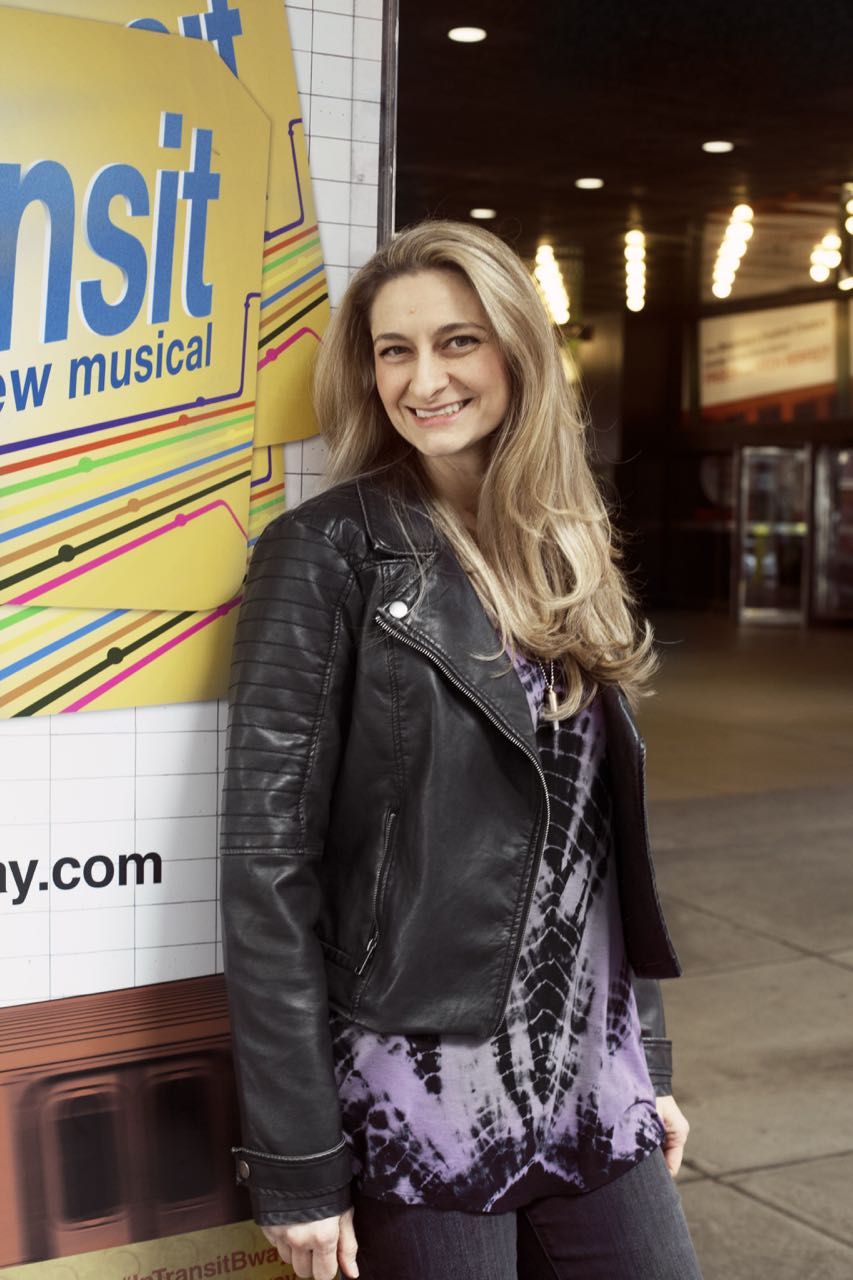
Was the process different because of the a capella part of it? Did it change the mode of storytelling because the musicians are basically on stage and characters?
Kristen: Similar to Hamilton or Godspell or the way that [director] John Doyle operates with his shows—it’s an ensemble. It goes back to Peter Brook and the empty stage kind of ensemble, building a story with their bodies and their energy. A capella just feeds right into that kind of theatre, which is a kind of theatre I love. I don’t think that part was as challenging as some of the more mechanical issues of telling this story. The more mechanical issues were figuring out the technology that would allow us to play in a three-quarter thrust and still have the actors in time. I think we’ve had to sort of invent technology to do that. Some of the biggest, hardest challenges for these actors are when they are off-stage changing costume but also singing the alto or tenor part and running around. That is the harder part, but once you’re on stage, it’s very similar to so many musicals you see that are of an ensemble nature.
Sara: In the creation of it, a capella was just our medium, just like an artist might paint in oils or something else. That was our medium. I think that we never told ourselves we couldn’t tell a story that way. We just kept thinking of interesting ways in which to use our ensemble singers who would be on stage at the same time, but it was very much just the regular old nuts and bolts of building a musical artistically. We just had fun with the a capella, and what is nice is that because we were an a capella group at one point, we were always able to test out the arrangements on ourselves as we wrote them. Some of the songs we wrote by vocal jam, which was just a really organic process. We never felt it was hindering us.
Kristen: The message of what we wanted to say was perfect for this a capella medium. When so many of us have these obstacles and these struggles and these stories of pain that we’re going through, trying to get from one station to another in our lives, for us, we found the way through that was by tuning into each other. We thought, “You know, New York and the subway is a great metaphor for this giant a capella group that is New York.” When you tune in, when you have those moments of just being down or like life has just kicked you in the teeth, sit down in Central Park for a second and just watch people. Take in the fact that it is kind of an amazing thing that we’re all connected like this in this swirling city of sound and light.
It was a case of content dictating form?
Kristen: Yes. And form dictating content. Every once in a while, if we would veer off track from what we wanted to say, a true north message for us is, “Does this have to be a capella?”
Sara: We didn’t want it to be just a device. We really have found a great way for it to be the metaphor and to earn its keep in our story.
It sounds like, from what you were saying before, that also a big part of the process has been having it up on its feet?
Sara: Huge.
Kristen: Yes, and that’s a very rare thing. That’s what made some of the development of this piece so challenging is how hard it is and how much money and what kind of resources you need to get this many people to learn 300 pages of score. 29-hour readings were not our friend. That’s part of the development process. There are certain rules in place that don’t help people who are trying to think outside the box. I’m a proud member of Actors’ Equity, but the Actors’ Equity rules were not conducive to developing this in a way that could happen quickly. Basically, the last time we saw this up on its feet was the Off-Broadway production [in 2010]. We’ve had several readings, but with the readings, in the best case scenario you get 60 hours because you put two 29-hours together, and that’s just enough time to learn these songs and stand in front of music stands. This was a learning process. We were very lucky to have a long preview period, because we needed it.
Sara: We used it. We really used it to work on all elements of the show. The sound design is pretty groundbreaking for the show and pretty exciting. I’m really thrilled with how it’s come out, and we really are like pioneers in that area. I’m excited about it.
In Transit has a contemporary setting and you’ve been working on it since 2001. Things have changed a lot between 2001 and 2016, sometimes quite rapidly. Do you find that you have to think about things a little differently than if you were doing a period piece?
Sara: Yeah. Absolutely. The songs have been written and rewritten and rewritten and rewritten. I think that this story lives best when it’s current. Some of the storylines I’m thrilled that we couldn’t keep up with quickly enough. We have a gay couple in our story, and back when we first started, marriage equality was not a thing, so I’m thrilled that that’s become a thing. We were excited to challenge ourselves to continue to make this story current, but it’s been a lot of meetings at diners.
Kristen: That’s the nice thing about it, because it’s also an excuse to see your friends. Every time technology changes, we have to look at Ali’s song. If we are lucky enough to get some momentum and get through this winter and create momentum—because people are really loving it, but we need to get that word out—if that happens and the word keeps spreading that you’re going to have an amazing, joyful, immersive time here, every six months or once a year, we will probably have to update scripts, where we look at where we are, we look at where technology is, we look at what are the posters in the subway, and we do a pass on the script.
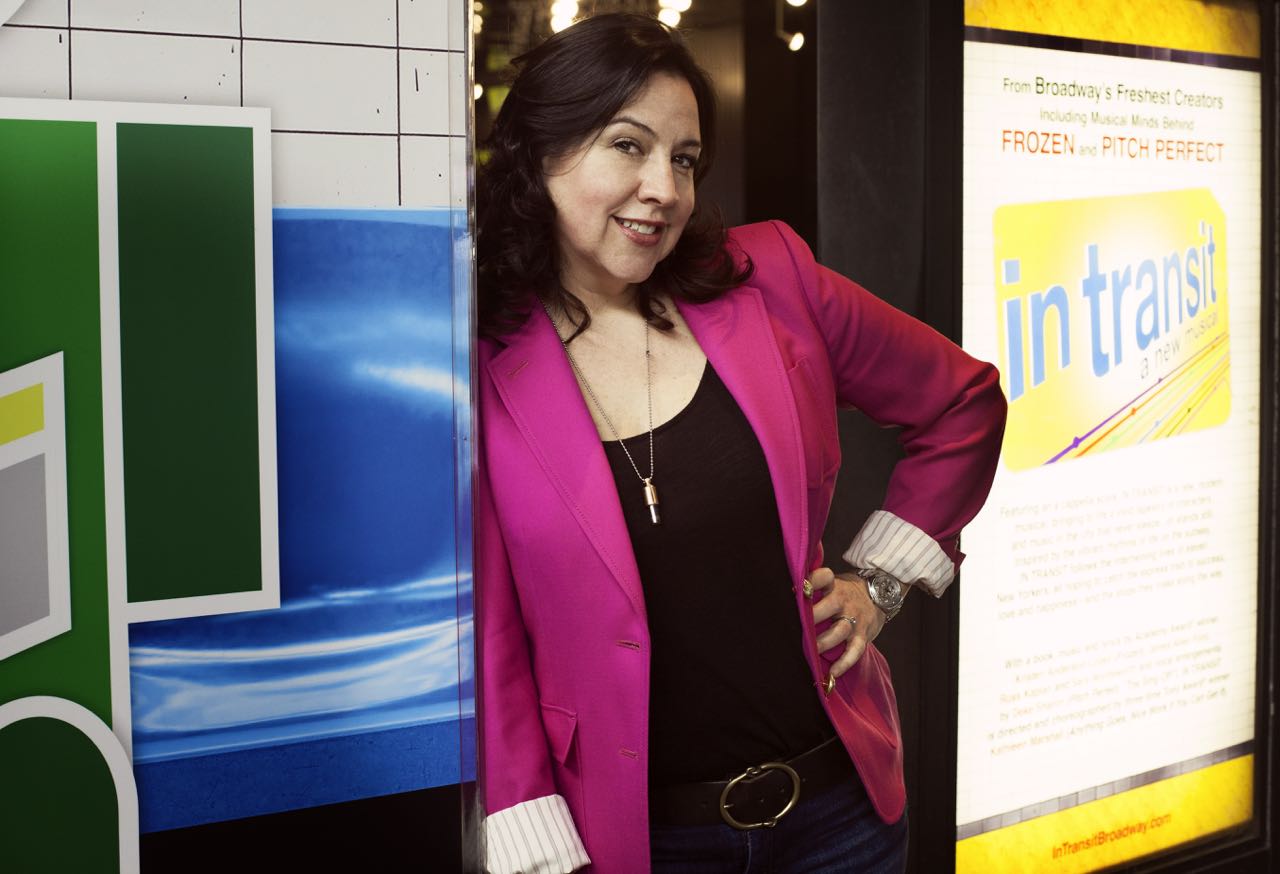
One of the things that I ask writers about is the development process being so long, and if they tend to think of their work as being somewhat frozen in time with the ideas that made them write it in the first place or not?
Kristen: James-Allen [Ford, co-writer] and I talk about collaborating with our former selves. We’re always like, “Okay. Let’s go back and collaborate with our former selves.” Put ourselves where we were at age 27 when we first had the germ for certain songs and remind ourselves what that felt like, what our brains were doing. One of the characters [in In Transit] is an actress who was struggling with, “Am I going to get anywhere? Am I ever going to have an achievement or make an impact in any way in this industry that I love so much?” It wasn’t long ago, I was sitting at someone’s desk and getting paid hourly and having this brain that wanted to do so much while I was just getting people’s coffee and making copies. Frozen changed my life a lot, but I still really understand and feel like that temp, so I just tap into her whenever I’m working on this show.
Sara: I think it’s ultimately good though that it took this long to develop, because I think that we are more interesting people. We are more interesting writers now, and I think we can tap into what was the initial idea behind it, but then bring to it all of our experience, both creatively and professionally. I just feel so appreciative that it took this long. Not only was it fun to write and have an excuse to see my best friend for all these years all the time, but I’m a much better writer for all the time that it took, and all the versions. I think that the development has been really special for the show and I don’t regret all the time it’s taken.
Kristen: That’s where my head is at this week. Press week is incredibly vulnerable. I’m so in awe of the people who do this again and again and again throughout their careers. The Alan Menkens and the Lynn Ahrens-es, and the people who take their creativity and curiosity and just keep putting themselves out there. This is my first time at the Broadway rodeo, and it is an exposed time. You feel incredibly vulnerable and what I hold onto is that, no matter what happens, no matter what anybody says in the paper on Sunday night, that I wouldn’t do anything differently. We’ve done the best we can and this whole journey has been a gift, and the success for me is that we’re all still good friends. We took this thing that we did out of love for New York and each other and got it to a Broadway theatre. It’s pretty cool.
How do you think the development process for musicals can be improved?
Sara: I think there’s always room for more time. There’s a lot of writing workshops. There’s a lot of places you can go and work on the writing, but there’s not a lot of places where you can work on the writing and have the actors at your disposal, have a literary staff at your disposal, have assistants at your disposal. So much of it is, you get this idea, and then it’s the busy work of typing it, copying it, distributing it. You have to have a budget for photocopies, especially for this kind of work. I think there [should be] more places where, in a very safe way, you could test out your work in front of an audience. That’s always what I’m looking for.
Kristen: The O’Neill was amazing. New York Stage and Film. Those are really vital places in figuring out how your show moves and what it is in front of an audience. I’ve been trying to think outside the box on one of the biggest issues, which is the short development process. I wish there was a way for actors to come learn music at night or something over the course of three weeks and then have two weeks of getting it on its feet. It takes a long time to internalize music and learn music in the way that it becomes a performance. When you have a two week workshop, basically you’re just shoving music down the actors’ throats, and by the time they look up, they’re at music stands and they’re singing in a room somewhere. They haven’t had a second to create a performance, to mull the material at all. If you do anything that’s musically complicated, which my work tends to be—I really love using choral harmonies—that takes hours to ingest and incorporate into the body, and then you never get a chance to see how that would move.
Something that has come up a few times recently is people wanting the designers incorporated into the development process.
Sara: Absolutely. We were very fortunate. Our producers did an amazing thing and they brought in the sound designer to our rehearsals. We started with this in-ear monitor technology our second week in the rehearsal studio. We were able to have them well before we stepped into tech. I don’t know how we would have done it without that, because they started to mix the in-ear mix for the actors in the rehearsal studio.
Kristen: Ken Travis [sound designer] has been part of this experience since 2010. Every workshop we did, Ken Travis was used for sound, so he was able to have several experiences of how hard this was going to be. He was able to, over the course of time, kind of trouble shoot, “Okay. Here’s what I need to do if we’re really going to pull this off.” and we were very, very lucky that he had five years to think up what to do.
Sara: We’ve had the same music supervisor [Rick Hip-Flores] all that time too, and I think having both of those people stay with us for the past few years has been a gift and it’s been great.
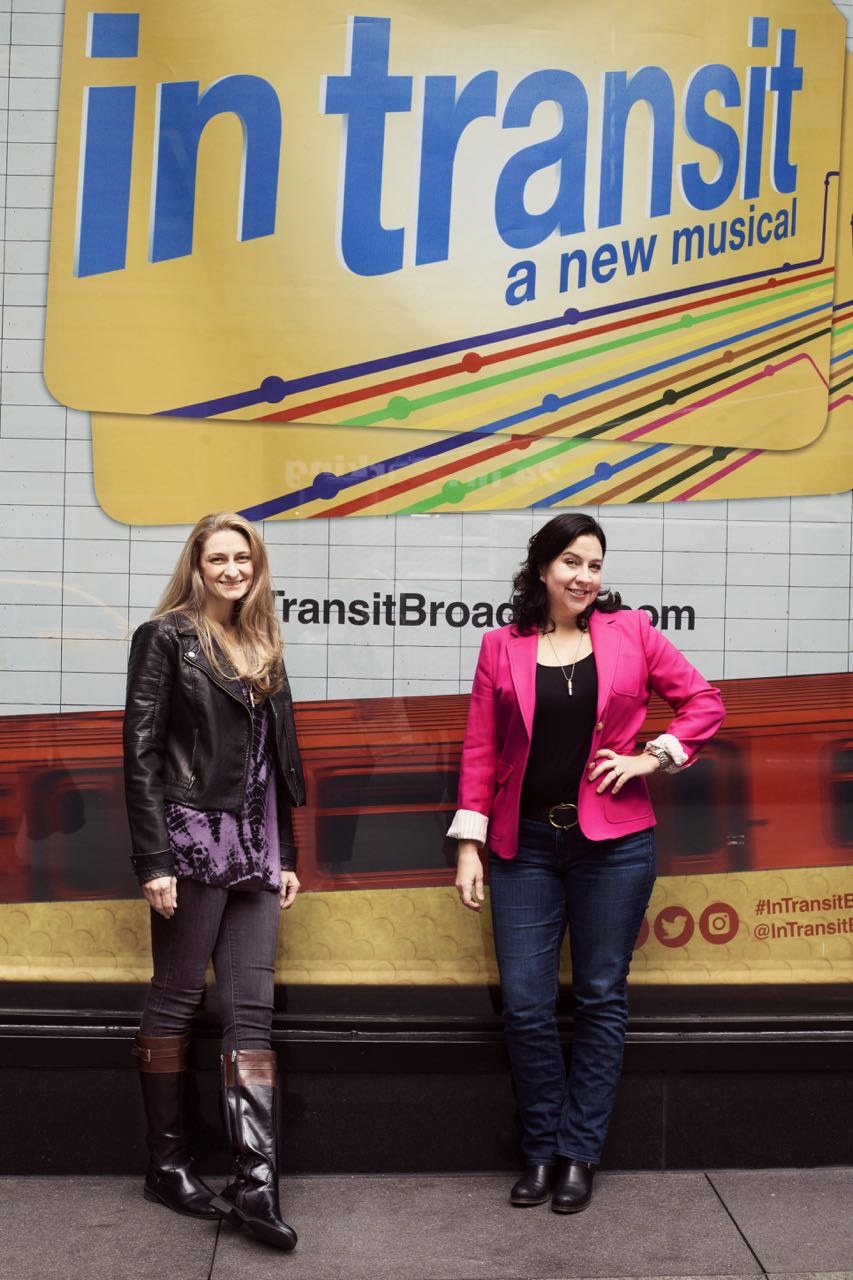
Kristen, I know you’ve talked quite a bit about how you didn’t realize you were a lyricist until later in life because you didn’t see female lyricists represented. I know that you both know the statistics that most musical theatre writing programs currently graduate women and men at about the same rate, but something happens after that where the men get more productions than the women.
Kristen: My thoughts on that are we’re still dealing with the same [stuff]. You just saw it play out in our election. It’s a stacked deck. Women have to prove themselves to be seventeen times better to have the same chance as men. It’s pervasive. It goes on whether you get hired for the young audience thing, that first job, and then it happens at the corporate level sometimes where they’ll take the bet on the guy because of institutionalized bias. It’s just a small, small inkling of, “Sondheim is a guy, so let’s go with guy. He might be the next young Sondheim.” If we had the female version of that somewhere out there—and we do, but she’s fighting all kinds of other institutionalized biases—she’s fighting reviewers that don’t share the same experience as her. I think how to make it better is where our conversation needs to go now. I will say that I’m so grateful to Barbara Pasternak, who took a chance on this female to do that young audience thing. Then, I’m so grateful to Walt Disney who took a chance and gave me Finding Nemo The Musical, and that’s how I became part of the Disney family. I’m so grateful to John Lasseter, who champions female writers. I think it’s those individuals [who are making a difference]. And the investors, because the investors are the ones in the Broadway world who can make the difference. If investors want to see more female work, they have to invest in female writers and in developing female writing and work. We are strong, we are smart, and we give it our all. If investors are willing to spend the huge bucks and bet on that, I guarantee they’ll have the hardest working writers in the industry who are there every day making changes and thinking about it when they’re up with their kids at three in the morning.
Sara: All of that. I also think that there’s something that happens, at least in my experience, to women of the child-bearing age, women that have become moms and have young children. There are a lot of opportunities out there now where there are writing retreats and things you can bring your children to and they’re starting to become more visible, but I have a four year old, and for the first two years that I had her, I stopped applying for those things because I guess I knew they were out there, but I certainly didn’t think I could go or that I’d be able to handle it. I was working on things and I had things, but I stopped applying to anything out of town. I stopped applying to anything that would remove my entire family and go do something. I’ve been thinking about that a lot lately and thinking how much I need to show myself doing it on social media. The best thing is showing it—showing that in between shows, I’m having dinner with my kid, and I’m showing that the family can be a part of the process and that all systems are not breaking down. That just showing that we can do this, so don’t stop doing it.
Does that feel like extra pressure? And I’m asking these questions, but men don’t get asked, “What’s it like to be a male writer?”
Kristen: I’m at a moment where I’m perplexed about what do we do in this society to change it. We’ve talked about it a lot and the numbers are still the same. It played out on a global level this year. I think that we just have to continue to praise [women] and if everybody supports the people who are supporting the female writers and go where the money is, things will change.
Sara: I’m also wondering if we should keep having concerts that feature just female work because we keep pointing out that it’s something different. I’m trying to figure that out for myself—that fine line between talking about it and yet just doing and showing. To be perfectly honest, I didn’t even know the woman writer thing was a problem until I started reading all the articles about it because my friend [Kristen] was doing it. I started watching her do it and I thought, “I’m going to just do it.” I think that that’s the most powerful tool we have, is for those who are doing it to keep doing and showing, and keep encouraging other women to do it as well.

